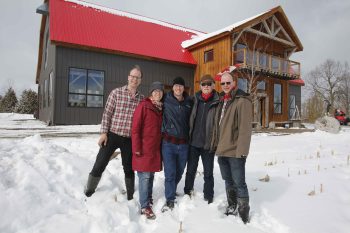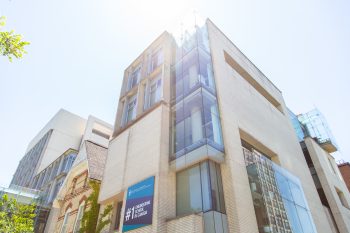Professor Omar F. Khan (BME) and his team of student researchers, the OFK Lab Blue Coats, focus on tackling diseases that are currently incurable and untreatable. Their secret weapons are a family of genetic building blocks known as nucleic acids, and nanotechnology.
“Nucleic acids are molecules found naturally in the body that act as instruction sets. They include RNA and DNA,” says Khan. “Cells in your body can read the instructions encoded in these molecules and perform the tasks in those instructions.”
“My lab works on discovering the right combination of instructions to help cells heal themselves, repair damage and even prevent disease. Complementarily, we also create the nanotechnology to deliver those instructions.”
Khan is among seven U of T Engineering researchers to be awarded Canada Research Chairs (CRCs) today.
Being named Canada Research Chair in Nucleic Acid Therapeutics is not only “a great honour,” says Khan, but a “challenge to achieve more.”
His team is currently working on a diverse range of projects. Some involve new nucleic acid technologies that combat viral diseases — potentially including COVID-19 — by targeting and destroying viral genes directly.
Others focus on building nucleic acid delivery technologies that control the release of instruction sets over time after a single injection. This approach could be used in combination with emerging clinical tools such as mRNA vaccines.
“With controlled release, we can design vaccines with no booster shots,” he says.
His lab is also building delivery technology that carries instructions to stop destructive inflammation, which, in the absence of treatment, prevents efficient healing after heart attacks and arthritis flare-ups.
The CRC program will provide Khan’s lab with additional resources to recruit new students from diverse technical backgrounds.
“My lab is built around convergence and diversity,” says Khan. “In my experience, diversity in technical backgrounds, methods and thought always leads to more discovery and innovation.”
Launched in 2000, the CRC program invests up to $295 million each year to support research excellence in engineering, health sciences, natural sciences, social sciences and humanities across Canada.
In addition to Khan, six other U of T Engineering researchers have earned new or renewed Canada Research Chairs:
- Elizabeth Edwards (ChemE) Canada Research Chair in Anaerobic Biotechnology (renewal)
- Penney Gilbert (BME) Canada Research Chair in Endogenous Repair (renewal)
- Heather MacLean (CivMin) Canada Research Chair in Sustainable Systems and Technology Assessment (new)
- Daniel Posen (CivMin) Canada Research Chair in System-Scale Environmental Impacts of Energy and Transport Technologies (new)
- Milica Radisic (BME, ChemE) Canada Research Chair in Organ-on-a-Chip Engineering (new)
- Ning Yan (ChemE) Canada Research Chair in Sustainable Bioproducts (new)
“This funding program is an excellent platform for science communication and education,” says Khan. “We live in an incredible time where the pace of discovery and innovation is staggering. This position will help me accelerate my efforts to explain and share known and new science.”



